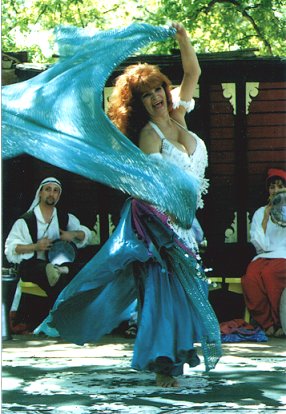The following is an article that was published in the
Today section of the January 12, 2000 Dallas Morning News:
Egyptian workers embellish Texas dancing
by
Linda Jones, staff writer for the Dallas Morning News
There
is much more to Nancy "Isis" Bartlett's belly dancing than meets the
navel.
The
Bedford-based veteran of Middle-Eastern dance has entertained audiences in Texas
for 20 years as a solo artist and with her dance troupe.
As
owner of Star Dancer Studio and Belly Dance Treasures, Isis belly-dances for
profit and for fun. But she also has used her talents and her business to help
the less fortunate keep their bellies full.
For
the last three years, Isis has had a special connection with an impovershed
village in Egypt, a village in which the women rely heavily on business for Isis
and a few others to feed their families.
"We were told that there are women there who are widowed and there is no
way they are going to make it without having an income," says Isis, who
uses only her stage name.
"It's not like we were looking for causes, but once we realized what a
difference it was making, it made a difference to us."
The
women who live in the village of Kom Ombo on the Nile, just north of Aswan, make
about half the costumes and accessories that Isis uses to stock her small
boutique and to keep her approximately 300-member dance company dressed in
beaded finery.
Essam
El Houchy, one of two Egyptian brothers and businessmen who act a liaisons
between Isis and the village seamstresses, says the work gives the women a
degree of independence.
"When it is slow, they ask, 'Where is work, where is work?' " he says.
The
relationship with the villagers wasn't a project Isis planned. They were already
doing their share of benefits and fund-raisers locally.
|
The Egyptian
connection happened three years ago during a trip she and her husband,
Del, made to a crafts market in Las Vegas. She was looking for fabric and
jewelry to make for her costumes when she met Mr. El Houchy, who was there
as a vendor. He told her there were women in their country who were very
poor and needed work. Because of restrictions placed on women there, it
was easier for them to earn a living working at home. He told Isis they
were talented seamstresses and could make fine, intricate costumes for
her.
Isis made a deal
with the vendors and started out small by ordering a few dozen scarves and
accessories for her dancers to wear when they practice.
Soon they
increased the orders to as many as 40 dozen costumes and accessories made
of fabric such as silk and chiffon. The women crochet, do the beadwork,
and attach other ornaments such as coins. |

|
"They are doing very tedious handwork, and the quality is exquisite,"
she says. "It can take about one or two days to make one scarf."
Isis
says there are about three foreign businesses that support the women's
livelihood in Kom Ombo. Mr. El Houchy told her that her business provides the
bulk of the orders that keep the women employed. She doesn't talk about the
bottom-line figures; she preferes to speak in terms of what it does for
well-being of the women's families.
Isis
says she buys the material and creates the designs, then sends it through a
contact to the village for the women to make. The women also send samples of
their designs to see whether Isis would be interested.
"We learn from them, and they learn from us," Isis says.
One
thing Isis has learned is that the women are intrigued by the dimensions of her
American dancers.
"They think the women in America all have big busts and small hips,"
she says. "They said if we were to take the costumes that they have they
wouldn't fit us. The belts would probably be 6 to 12 inches wider than our hips,
and the busts would be smaller.
"They think it's so funny. They say 'Are you sure they are built this way?'
"
Denise Mann, one of the dancers, says she was forced to make her own costumes
for the first eight years she was with Isis' dance company because there was a
shortage of authentic costumes available in the United States.
"We've created a big market for them now," she says. "How many
people in America can sit around and make belly-dance costumes and make a living
out of it? Not very many," she says.
Isis
never has met the women of Kom Ombo, but says she feels a strong, sisterly
connection with them.
"We are all women, and most of those who come to our studio are studio
women. The reason I have taught as long as I have isn't just the teaching of a
talent; it's watching women gain self-confidence and gain the ability to feel
good about themselves.
"I feel we're doing the same thing over there by buying the products they
have and helping them with their quality of life."

